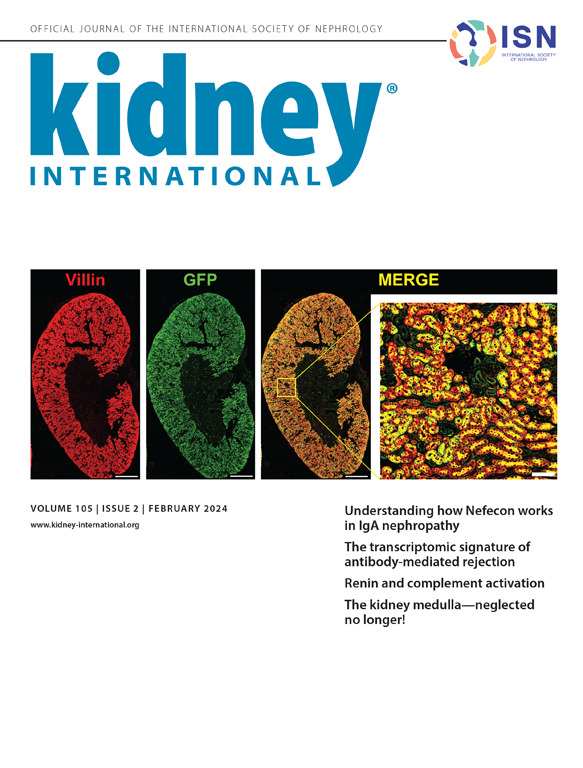A population-based cohort study defined estimated glomerular filtration rate decline and kidney failure among Canadian immigrants
IF 14.8
1区 医学
Q1 UROLOGY & NEPHROLOGY
引用次数: 0
Abstract
The link between immigrant status, a key social determinant of health, and kidney disease remains uncertain. To evaluate this, we compared incident adverse kidney outcomes between immigrants and non-immigrants using Canadian provincial health administrative data. We conducted a population-based observational cohort study of all adult Ontario residents (immigrants and non-immigrants) with normal baseline kidney function (estimated glomerular filtration rate (eGFR) 70 mL/min/1.73m2 or more). Multivariable Cox proportional hazard regression modeling was used to evaluate the relationship between immigrant status and the composite adverse kidney outcome of 40% eGFR decline or kidney failure. The study cohort included 10,440,210 individuals with 22% immigrants and 78% non-immigrants. The mean (Standard Deviation) age and eGFR were 45 (17) years and 102 (16) mL/min/1.73m2, respectively. Immigrants experienced a 27% lower hazard for the composite adverse kidney outcome (adjusted hazard ratio 0.73 [95% Confidence Interval 0.72-0.74]) compared to non-immigrants which was primarily driven by 40% eGFR decline. However, immigrants also experienced a 12% lower hazard for incident kidney failure (0.88 [0.84-0.93]) compared to non-immigrants. Results were consistent upon accounting for the competing risk of death and adjusting for baseline albuminuria. As has been demonstrated with other chronic diseases, these novel findings suggest that a “healthy immigrant effect” also extends to kidney disease. Differential kidney disease outcomes were identified among immigrants based on refugee status and world region of origin which may inform health policy decision-making toward targeted screening strategies and more cost-effective resource allocation for immigrant populations.
一项基于人群的队列研究确定了加拿大移民肾小球滤过率下降和肾衰竭的估计。
移民身份是健康的一个关键社会决定因素,但移民身份与肾脏疾病之间的联系仍不确定。为了评估这一点,我们使用加拿大省级卫生行政数据比较了移民和非移民之间的不良肾脏结局。我们对基线肾功能正常(估计肾小球滤过率(eGFR) 70 mL/min/1.73m2或更高)的所有成年安大略省居民(移民和非移民)进行了一项基于人群的观察队列研究。采用多变量Cox比例风险回归模型评估移民身份与eGFR下降40%或肾衰竭的复合不良肾脏结局之间的关系。研究队列包括10,440,210人,其中22%是移民,78%是非移民。平均(标准差)年龄为45(17)岁,eGFR为102 (16)mL/min/1.73m2。与非移民相比,移民的综合肾脏不良结局风险低27%(校正风险比0.73[95%置信区间0.72-0.74]),后者主要是由40%的eGFR下降所致。然而,与非移民相比,移民发生肾衰竭的风险也低12%(0.88[0.84-0.93])。在考虑竞争死亡风险和调整基线蛋白尿后,结果是一致的。正如其他慢性疾病所证明的那样,这些新发现表明“健康移民效应”也延伸到肾脏疾病。根据难民身份和世界原籍地区,确定了移民中不同的肾脏疾病结局,这可能为卫生政策决策提供信息,以制定有针对性的筛查策略,并为移民人口提供更具成本效益的资源分配。
本文章由计算机程序翻译,如有差异,请以英文原文为准。
求助全文
约1分钟内获得全文
求助全文
来源期刊

Kidney international
医学-泌尿学与肾脏学
CiteScore
23.30
自引率
3.10%
发文量
490
审稿时长
3-6 weeks
期刊介绍:
Kidney International (KI), the official journal of the International Society of Nephrology, is led by Dr. Pierre Ronco (Paris, France) and stands as one of nephrology's most cited and esteemed publications worldwide.
KI provides exceptional benefits for both readers and authors, featuring highly cited original articles, focused reviews, cutting-edge imaging techniques, and lively discussions on controversial topics.
The journal is dedicated to kidney research, serving researchers, clinical investigators, and practicing nephrologists.
 求助内容:
求助内容: 应助结果提醒方式:
应助结果提醒方式:


